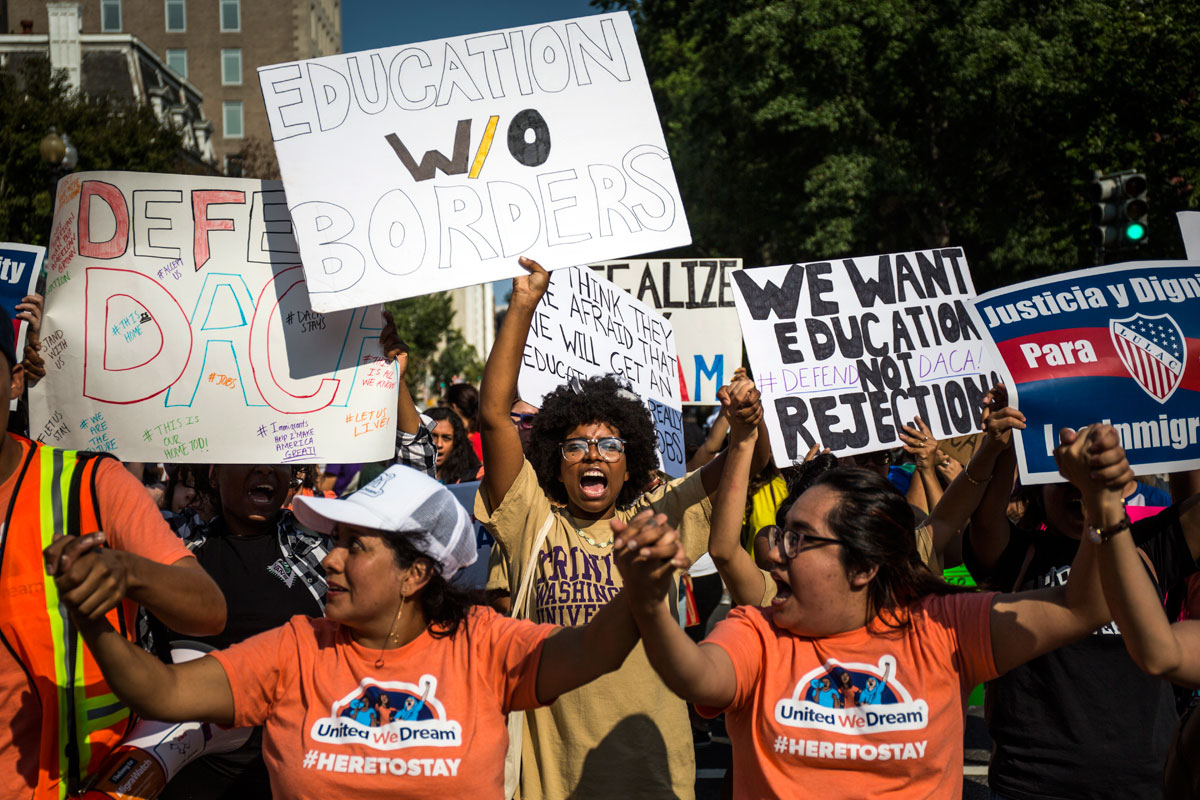DACA: U.S. Workers Must Come First, Trump Defends End of Amnesty
Demonstrators block traffic on H Street during a rally in support of the Deferred Action for Childhood Arrivals (DACA) program after the Trump Administration announced its plan to end the program on Sept. 5, in Washington, D.C. DACA, an immigration policy passed by former President Barack Obama, allows certain undocumented immigrants who arrived in the United States as minors to receive renewable two-year deferred action from deportation and eligibility fork a work permit. (Zach Gibson/Getty Images)
Trump defended his decision, saying “American workers” must come first and the move was in the country’s best interest, as he scrapped an Obama-era amnesty program, Sept. 5, that granted work permits to immigrants who arrived in the country illegally as children, a move likely to impact 800,000 undocumented workers including more than 7,000 Indian Americans, writes Lalit K. Jha.
“As President, my highest duty is to defend the American people and the Constitution of the United States of America. At the same time, I do not favor punishing children, most of whom are now adults, for the actions of their parents. But we must also recognize that we are nation of opportunity because we are a nation of laws,” Trump said in a statement after his decision to end the amnesty invited widespread criticism.
He said that in the best interests of the country, and in keeping with the obligations of his office, the Department of Homeland Security will begin an orderly transition and wind-down of DACA, one that provides minimum disruption.
“While new applications for work permits will not be accepted, all existing work permits will be honored until their date of expiration up to two full years from today (Sept. 5). Furthermore, applications already in the pipeline will be processed, as will renewal applications for those facing near-term expiration,” Trump explained.
“This is a gradual process, not a sudden phase out. Permits will not begin to expire for another six months, and will remain active for up to 24 months. Thus, in effect, I am not going to just cut DACA off, but rather provide a window of opportunity for Congress to finally act,” the president said.
Congress, he said, now has the opportunity to advance responsible immigration reform that puts American jobs and American security first.
“Our first and highest priority in advancing immigration reform must be to improve jobs, wages and security for American workers and their families,” Trump said.
“We are facing the symptom of a larger problem, illegal immigration, along with the many other chronic immigration problems Washington has left unsolved. We must reform our green card system, which now favors low-skilled immigration and puts immense strain on U.S. taxpayers,” he said.
“We must base future immigration on merit – we want those coming into the country to be able to support themselves financially, to contribute to our economy, and to love our country and the values it stands for. Under a merit-based system, citizens will enjoy higher employment, rising wages, and a stronger middle class,” he added.
Senators Tom Cotton and David Perdue have introduced the RAISE Act, which would establish this merit-based system and produce lasting gains for the American People, Trump said.
With widespread protest against his decision, Trump assured the country that he will resolve the DACA issue with heart and compassion – but through the lawful Democratic process – while at the same time ensuring that any immigration reform his administration adopts provides enduring benefits for the American citizens they were elected to serve.
“We must also have heart and compassion for unemployed, struggling, and forgotten Americans,” he said.
Earlier in the day, Sessions sent a letter to the Department of Homeland Security explaining that DACA was not statutorily authorized and was therefore an unconstitutional exercise of discretion by the executive branch.
The White House said Sessions found that DACA, given pending litigation, would likely face the same outcome as the Deferred Action for Parents of Americans and Lawful Permanent Residents (DAPA) program, which was enjoined by the courts.
“The Trump Administration is taking responsible action to wind down DACA in an orderly and minimally disruptive manner. If President Trump allowed DACA to go to court, it is likely that the court would abruptly enjoin the program,” it said.
If Trump had refused to act, many States were prepared to pursue litigation to end DACA by court order, it added.
Under the change announced today, Sept. 5, current DACA recipients generally will not be impacted until after March 5, 2018, six months from now. That period of time gives Congress the opportunity to consider appropriate legislative solutions.
“DHS’ enforcement priorities remain in place. However, absent a law enforcement interest – which is largely the standard that has been in place since the inception of the program – the Department will generally not take actions to remove active DACA recipients,” it said.


